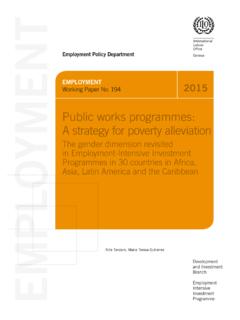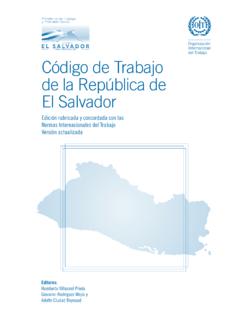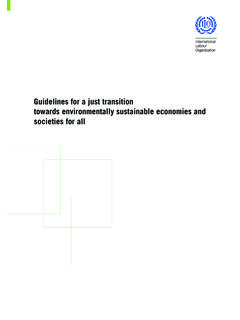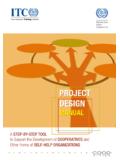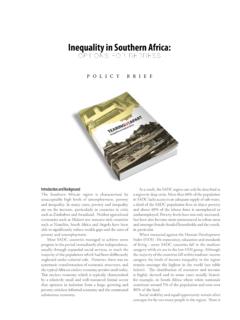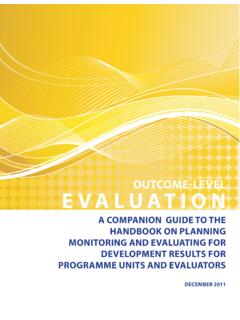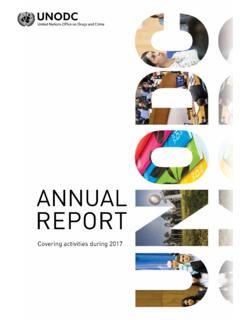Transcription of 7. PROJECT EVALUATION - International Labour Organization
1 7. PROJECT EVALUATION 7. PROJECT EVALUATION CONTENTS INTRODUCTION AND POLICY CONTEXT ..3 CONCEPT OF PROJECT EVALUATION as part of managing for Learning from The clients of PROJECT 7 PRINCIPLES OF PROJECT Strengthening credibility and Learning to National ownership and Professional and ethical ILO Financing for PROJECT Types of Required evaluations according to type of ROLES AND ! BOOKMARK NOT DEFINED. EVALUATION EVALUATION focal persons in regional offices and technical PROJECT ILO responsible official and PROJECT backstoppers.
2 15 ILO EVALUATION PREPARING FOR AN Defining the purpose, scope and clients of an Applying the PROJECT logic as a reference What to evaluate? The key EVALUATION criteria and Preparing the terms of reference of the Hiring a IMPLEMENTATION OF PROJECT EVALUATION AND EVALUATION ! BOOKMARK NOT DEFINED. Structure of the EVALUATION Discussion of the EVALUATION findings and preparation of final FOLLOW-UP, DISSEMINATION AND KNOWLEDGE Follow-up to EVALUATION findings and Knowledge sharing and organizational ANNEX ILO TECHNICAL COOPERATION MANUAL - VERSION 1 7.
3 PROJECT EVALUATION 1. Glossary of EVALUATION terms ILO TECHNICAL COOPERATION MANUAL VERSION 1 27. PROJECT EVALUATION INTRODUCTION AND POLICY CONTEXT This chapter sets out the principles and policies governing the EVALUATION of ILO-supported projects. It describes how the EVALUATION of PROJECT achievements improves decision-making, organizational learning, accountability and impact. The chapter clarifies roles and responsibilities and sets out the procedures for managing PROJECT evaluations.
4 PROJECT EVALUATION is a systematic and objective assessment of an ongoing or completed The aim is to determine the relevance and level of achievement of PROJECT objectives, development effectiveness, efficiency, impact and sustainability. Evaluations also feed lessons learned into the decision-making process of the PROJECT stakeholders, including donors and national partners. EVALUATION is also an important part of the ILO s accountability to its donors and to the Governing Body.
5 This chapter provides information on: The concept and principles of PROJECT EVALUATION ; ILO policies for PROJECT evaluations and roles and responsibilities; Preparing for an EVALUATION ; The implementation of PROJECT EVALUATION and EVALUATION report; Follow-up, dissemination and knowledge sharing of EVALUATION outcomes. Additional guidance on EVALUATION is available from the ILO EVALUATION Unit (EVAL). A glossary of EVALUATION terms can be found in Annex 1. CONCEPT OF PROJECT EVALUATION EVALUATION AS PART OF MANAGING FOR IMPACT Design, monitoring and EVALUATION are all part of results-based PROJECT management.
6 The key idea underlying PROJECT cycle management, and specifically monitoring and EVALUATION , is to help those responsible for managing the resources and activities of a PROJECT to enhance development results along a continuum, from short-term to long-term. Managing for impact means steering PROJECT interventions towards sustainable, longer-term impact along a plausibly linked chain of results: inputs produce outputs that engender outcomes that contribute to impact (see Figure 1).
7 The prime reason why the ILO engages in technical cooperation projects and why it receives funding from donors is to have a positive impact in relation to policies, processes, regulations, behaviour, and, ultimately, on individual lives. 1 Definition according to the Glossary of key terms in EVALUATION and results-based management that was developed by the Development Assistance Committee (DAC) of the OECD and which has been adopted by the ILO along with most other United Nations agencies and development agencies.
8 (See annex for more definitions; on the EVAL Web site is a link to the full glossary.) ILO TECHNICAL COOPERATION MANUAL VERSION 1 37. PROJECT EVALUATION Figure 1. Managing for impact The results chain of a PROJECT Investments (resources, ) and activities Products and services provided Immediate achievements of our partners Long-term, sustainable changes Inputs Outputs Outcomes Impact Result linking to Development ObjectiveResult linking to Immediate Objective Outcomes are defined as medium-term effects of PROJECT outputs.
9 Outcomes are observable changes that can be linked to PROJECT interventions. Usually, they are the achievements of the PROJECT partners. They are logically linked to the intended impact. Outcomes are the results that link to the immediate objectives as described in the PROJECT document. Impact is defined as the positive and negative, primary and secondary long-term effects produced by a development intervention, directly or indirectly, intended or Impact is the result that links to the development objective as described in the PROJECT document.
10 It is often only detectable after several years and usually not attained during the life cycle of one PROJECT . For this reason, there is a need to plan for impact, recognizing that the PROJECT will likely achieve outcomes. A PROJECT is accountable for achieving outcomes and contributing to development impact. Since the achievement of broad, long-term development changes depends on many factors, it is usually not possible to attribute impact to one PROJECT . All outcomes of a PROJECT should contribute to the intended impact.


